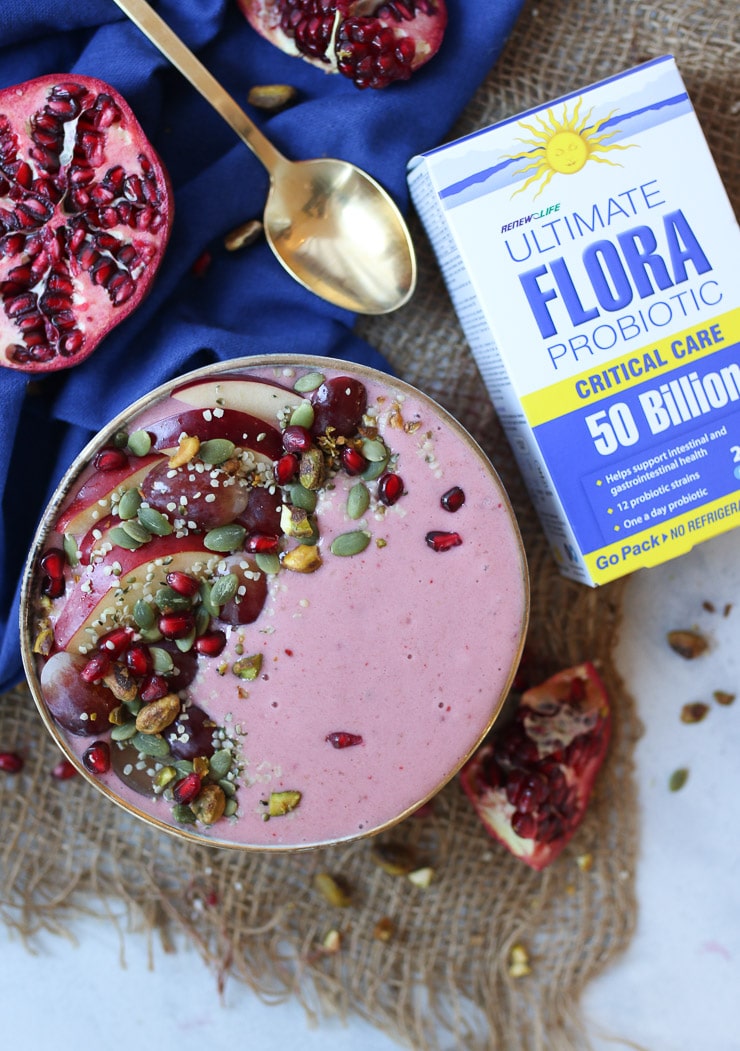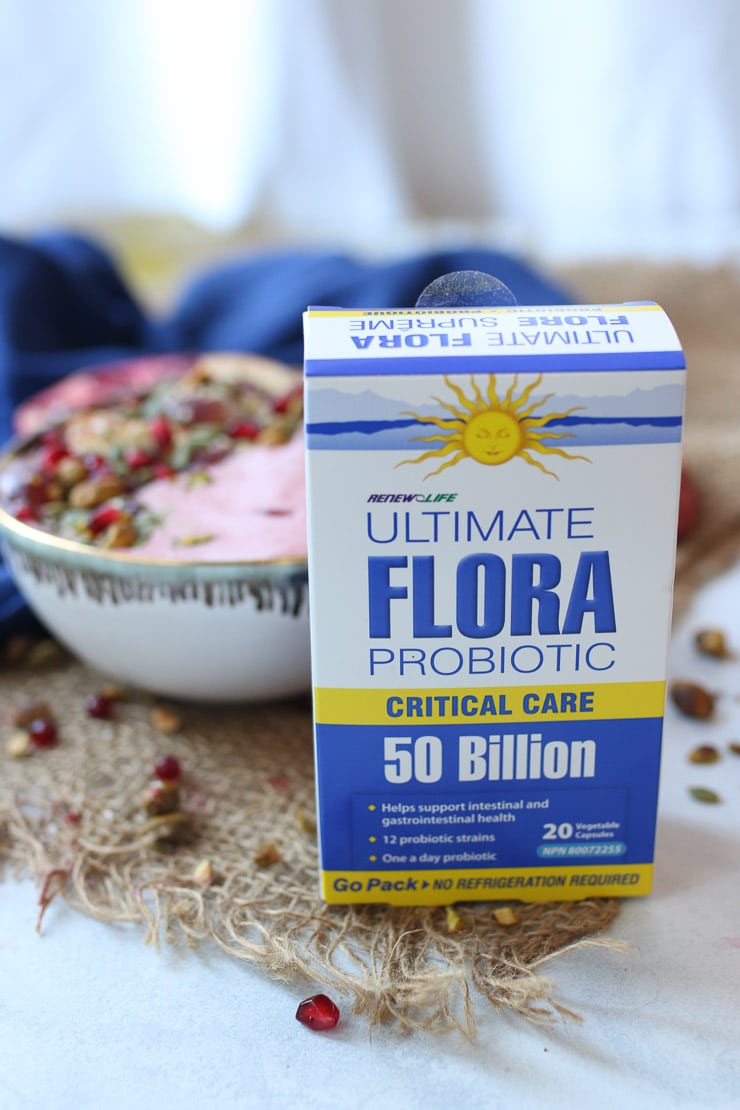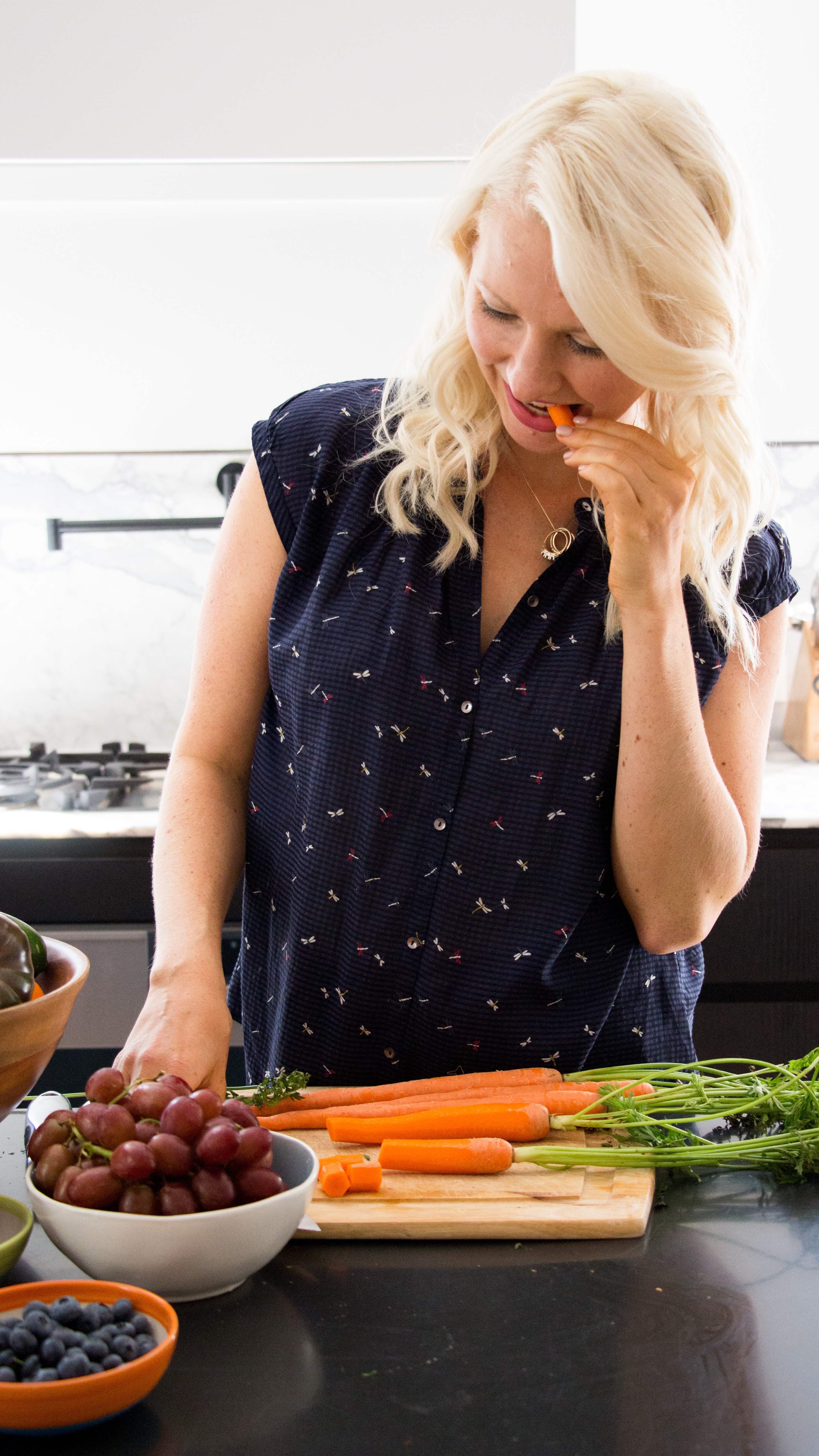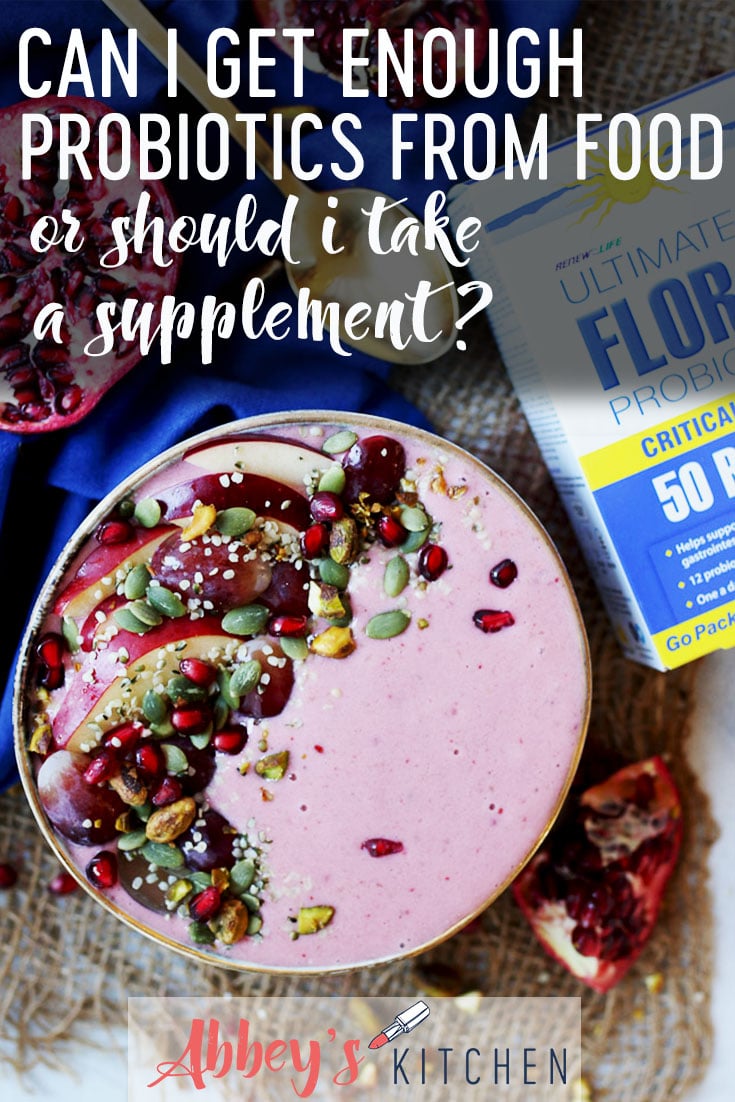We discuss if you need a probiotic supplement or if you can get enough probiotics from yogurt and other enriched foods alone.
I bet a lot of us never expected that bacteria would become the center of a lot of dinner table conversations. What’s even more surprising to me is that it’s a topic we no longer need a biology masters in to take part. What was once a slightly unnerving word associated with overused (and underwashed) sponges, is now considered the holy grail of the wellness industry. And as a dietitian kinda obsessed with the stuff, I’d say it’s for good reason. We’ve already waxed poetic about the benefits of probiotics (aka bacteria) here and here, and discussed the role of probiotics on lactose intolerance, heart health, immunity, inflammation, bone health, digestive health, metabolism, anxiety and more. If you read all that, you’re probably not shocked that bacteria has become big business. In 2015, the global market size for probiotic-related products was pegged at 36.6 billion USD, and is expected to skyrocket to 64 billion USD by 2023. From probiotic infused yogurt, to orange juice, to granola bars and cereal, there’s now a lot of ways to get bacteria back into your snack.
But Can I get Enough Probiotics from Yogurt Alone?

Technically, sure. Realistically, I’m unsure. See, I am all for eating probiotic-enriched foods if you find them satisfying and tasty. I’m particularly a huge fan of yogurt – probiotic or otherwise – because it’s a great way to get in protein, calcium and vitamin D in a delicious snack. But if you’re relying on a medley of snack foods to cultivate a strong and disease-fighting microbiome, it’s possible you won’t be getting your fix.
Why You Shouldn’t Rely on Yogurt or Probiotic Enriched Snacks for Probiotics
Let me explain my position with a few of the biggest concerns I have about people expected clinically sizable benefits from relying solely on probiotic enriched foods.
You MAY NEED TO Eat a Lot of Snack Foods
Yogurt, in my books, is generally healthy. And if you can choose a low sugar high protein yogurt (like Greek) that has probiotics in it, it’s very healthy! But now there are a wide range of probiotic-enriched foods on the market, many of which don’t hold the same nutrition benefits. Yet, they have what we call in the industry a “health halo”. In other words, they can do no wrong just because they have a probiotic label smacked on the front of them.
My concern is that when a fellow mama sees probiotic gummy bears in stores, she’s going to see them as a really healthy choice for her kids. And since we know probiotics are good for us, it’s easy to think that “more is better”. But guys, candy, with or without bacteria, is still freaking candy so let’s not kid ourselves into thinking all of these are a healthy choice. Of course, there are lots of great-for-you snacks with probiotic benefits, but it’s still important to check the nutrition label and ingredients to see what else is inside.
The Limited Strains and Dose
There are over 500 strains of probiotic bacteria, and our body thrives on having a vibrant diverse collection of them in the gut. If you turn your yogurt or granola package around, you’ll likely see just one, maybe two, maybe three strains listed. Bifidobacterium, Lactobacillus, and Streptococcus are the usual suspects, often alone or in some combination. Â All of these are a great start, but research has found that multistrain and multispecies probiotics are much more effective at promoting digestive health because the species seem to have synergistic effects on each other.
Even though we don’t have any clear recommendations on how many CFU (colony forming units) each individual needs, we do know that dose is important. Research has shown that the dose (number of CFUs) in a lot of food products in the marketplace is significantly lower than the doses tested in randomized control trials. In other words, it could take up to 25 servings of yogurt to see the intended benefits you may have read about in a hot new study! Now, I love me a tasty yogurt parfait or smoothie bowl, but that’s a lot of yogurt.
That’s why if you want to see real changes in your gut health, I personally recommend a probiotic supplement. My go-to, Renew Life’s Ultimate Flora, contains 12 unique probiotic strains at up to 50 billion CFUs each. That’s in one capsule, not 25 cups of yogurt or granola bars – probably a lot more manageable for most people.
Limits to Bacterial Survival
Bacteria aren’t inert and their power is really only harvested when they’re alive and kicking (or crawling.. or creeping or whatever they do). The problem is, there are a lot of environmental conditions that influence their survival rate. For instance, both moisture and temperature can affect the survival of some bacterial strains, so when we carry around our snacks in our (unrefrigerated) gym bags or purse for weeks (or *gasp* longer), their gut-protecting power could be quickly wilting. This is why we only find certain strains in shelf-stable products, where refrigerated products can include a wider range of bacterial strains. Furthermore, it’s believed that some bacteria cannot survive the acidic conditions of the stomach, and therefore don’t even make it to the intestines to colonize the gut. This is why probiotic supplements like Renew Life’s Ultimate Flora have developed unique delivery systems to ensure they make it safely to the intestine.
Bottom Line on Supplements vs Probiotics from Yogurt or Snack Foods
I am a dietitian, meaning I am all for people getting their nutrition first and foremost from food. I whole heartedly recommend people enjoy a wide range of fermented foods that may have naturally occurring live active bacteria, as well as probiotic enriched foods like yogurt. However, I think if you’re looking for clinical, measurable improvements in gut health and overall health, it’s challenging to rely on the inconsistencies of food, alone. There are a lot of factors that play into the survival of bacteria – factors that can be better controlled for in a high quality supplement. So bottom line on the supplement vs food debate when it comes to probiotics is to eat the food because it’s good for your gut, but don’t forget that a supplement is an ideal compliment for getting the best digestive bang for your buck.
Now, friends, tell me- do you take a probiotic supplement or do you get your probiotics from food alone?
Leave me a comment below with your thoughts!
Disclaimer: This post was developed in paid partnership with Renew Life, however, all opinions are genuine.
Updated on May 12th, 2022

Abbey Sharp is a Registered Dietitian (RD), regulated by the Ontario College of Dietitians. She is a mom, YouTuber, Blogger, award winning cookbook author, media coach specializing in food and nutrition influencers, and a frequent contributor to national publications like Healthline and on national broadcast TV shows.









Shirley Snow says
If on Keto Lifestyle, do I require a probiotic?
Abbey Sharp says
If you’re not eating enough of those probiotic foods, then I would recommend a probiotic. I would speak with a dietitian or doctor on choosing the right one.
Penny says
It was taking 2 double strength acidophilus & Bifidus a day now I take 8 a day . I was told to take 30 billion aa day. Is that enough.
Abbey Sharp says
Hey Penny, I would speak with a dietitian in person so they can better tailor nutrition advice to your specific needs.
John says
Is it ideal to take a probiotic supplement in the morning and eat yogurt for a snack after dinner?
Heather says
I have not been concerned about my levels of probiotics. Where would I even start to measure if I am in need of them? I could say don’t mess with what is not broken. Or I do not want to take the blind shot gun approach which is guessing and taking a bit of this and that. I am suspicious that something is out. So yes where would I even start. Thanks
Abbey Sharp says
I think the first place to start is to look at how many probiotic foods you’re including in your diet. If it is fairly limited, then you may benefit from a probiotic. I would speak with a dietitian, who can assess your diet and figure out the best plan for you.
Ozge says
I support the idea of using probiotic supplements and I use them for my kids. However it seems like they dont work the best for my gut.. I have tried a few different brands under observation of my Nautropath but everytime I am on them, I get constipated. Not really sure, if that is the reason or it is coincedence..
Abbey Sharp says
Sounds like they’re not agreeing with you. I recommend meeting with a dietitian, and they can help you find what works for you 🙂
Sabine Walter says
I’m taking three kinds of probiotics alternatively; Multi-Strain Probiotics from InnovixLabs, ProbioMax Daily DF from XYMogen, and Ther-Biotic Complete from KlaireLabs — just so the gut doesn’t get bored. I was hoping that eventually I would not need to keep taking them, but the “bugs” must not like my body. As soon as I stop taking them, I’m back to constipation. So they are permanent tenants now. 😉 I’ve changed my diet 100%, using cronometer.com to make sure that by the end of the day I have all my nutrients, and I’ve incorporated 16 oz of kombucha daily into my diet. That seems to do the trick. I still eat yoghurt, but only plain greek (yummy with homemade peanut butter!), but I don’t rely on it for probiotic supply. Everything in moderation is my motto. Cronometer.com has really helped me stay on top of things. It’s a perfect guideline. Check it out sometime!
Abbey Sharp says
Thanks for sharing love! Love your moderation philosophy
Rhonda says
I saw a wonderful dietician after my bariatric surgery and she recommended BioGaia probiotic drops. I had seen some research which “seemed” to show taking probiotics led to more weight loss after this type of surgery (as well as the dietary changes involved). Have you seen any research regarding this issue?
Abbey Sharp says
I will look into that for you Rhonda. Thanks for your comment
jill conyers says
I take a probiotic daily. Individual needs vary depending on diet and lifestyle but I’m thinking more people than not would benefit from a probiotic.
Abbey Sharp says
For sure.
Julie Harris says
My Sister in law had a recent unique experience- once she stopped taking her probiotics she said she could eat cheese again without having GI symptoms. As with most supplements, it’s about finding what is right for our own bodies. As always, I appreciate your posts.
Abbey Sharp says
Thanks for sharing Julie
Farrah says
I’m all for yogurt as well but don’t think that it’s enough to give the daily fix of probiotics either, and it’s always important to remember to moderate! Great post!
Deborah Brooks says
These are good points. I think it’s important to evaluate your diet overall and see where you may need to supplement or not
Abbey Sharp says
For sure.